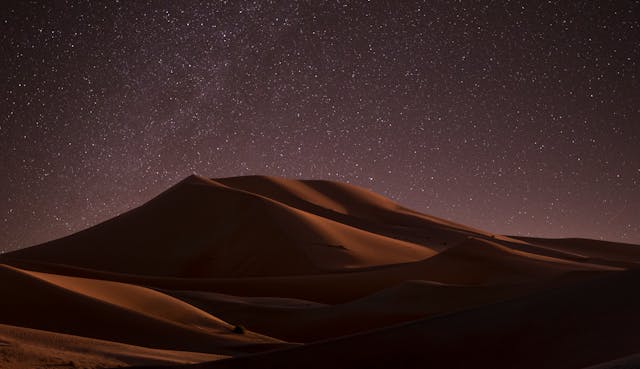
Why are deserts cold at night? Deserts get so cold at night because sand doesn’t retain heat, the air is very dry, there is no cloud cover, and deserts are not usually close to any large bodies of water.
Deserts are obviously famous for being extremely hot and if you are lost in a desert, the heat is a huge worry. However, the risk of freezing is also real because at night the temperature in the desert can plunge. The Sahara Desert, for example, can have daytime temperatures that reach the high forties and nighttime temperatures that can get down to -6 ℃. That is an incredible temperature range. What causes it? There are several reasons and these don’t apply to all deserts. Some deserts don’t have that much of a temperature range and some deserts, like Antarctica don’t get hot.
The first reason is the sand. Deserts like the Sahara that are covered in loose sand or loose stones don’t hold much heat. Sand is very good at reflecting heat back up. When it is struck by the sun’s rays, the top layer of sand is heated, but the sand releases the heat very quickly back into the air. This superheats the air above the sand and rises. During the day, there is a constant supply of energy from the sun, so more heat is taken in by the sand than is released. At night, there is no heat going in and the heat the sand holds gets released very quickly.
The second reason is that the air over a desert is often very dry. Water can hold a lot of heat energy, which means that the more water there is in the air, the warmer it is. It takes a lot of energy to heat water up, which means it takes a long time. It also takes a long time for the water to lose that heat energy again. Places that are very humid tend to be hot all day and all night because the water in the air gets heated during the day and then slowly releases that heat throughout the night, never losing all of it. Moist air is like a blanket over the ground. The air above a desert is very dry, which means there is no water to hold that heat in and it all just escapes into the sky, making the nights much colder.
The third reason is connected to the second. There are no clouds over a desert because the air is so dry. The water in the air above the desert helps to regulate the heat transfer from the ground, but clouds are also important. Clouds in the sky act to reflect heat back down towards the ground. If there are no clouds, heat that is lost from the ground just heads off into the atmosphere. If there are clouds, the heat is redirected back down towards the ground. You don’t have to be in a desert to feel this. If you are outside on a cloudless night, it will feel decidedly colder.
The fourth reason is also connected to the last two. Not always, but deserts are often located in the middle of continents. The main reason for this is that by the time moist air from the seas reaches the center of the continent, it has all rained out and only dry air is left. This has an effect on the nights in a desert because being close to a large body of water has the same regulating effect on the temperature as having a lot of water in the air will do. It takes a long time to heat water and the heat energy is released slowly, so being by the sea or a large lake can keep the days cooler and make the nights warmer. Deserts don’t have a large body of water so they get cold at night.
We would have trouble surviving in a desert at night, but a lot of animals have adapted. Snakes and lizards are cold-blooded so they don’t have any trouble. They last through the night and then warm themselves up again in the sunlight. Many mammals that live in the desert are very small and they can burrow to hide from the cold. Camels cannot burrow, but they have a lot of fat, which keeps them cold during the day and warm at night. Cactuses have evolved as well. They would freeze in the coldest nights, which would be bad for them, so you only find cactuses beyond what is called the freezeline. This is where it gets cold, but not cold enough to freeze, as you could probably guess from the name. And this is what I learned today.
Enjoyed this? Try these:
Sources
https://www.livescience.com/why-do-deserts-get-cold-at-night.html
https://www.labxchange.org/library/items/lb:LabXchange:4b4895cb:html:1
https://en.wikipedia.org/wiki/Sahara_desert_(ecoregion)
Photo by Walid Ahmad: https://www.pexels.com/photo/desert-during-nighttime-847402/
